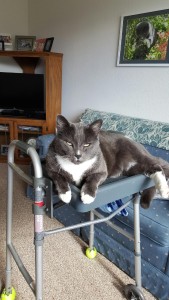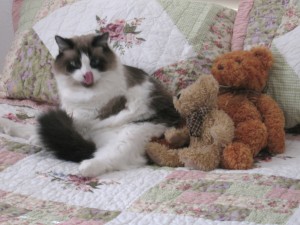 If your cat is older—even past eight-years-old—and she walks around the house at night crying, she may be suffering from the onset of dementia. Just as with us humans, age-related dementia can cause anxiety in cats and cause them to be confused. It’s particularly difficult for them at night when they wake up and no one’s around to comfort them so they may roam the house, confused and yowl.
If your cat is older—even past eight-years-old—and she walks around the house at night crying, she may be suffering from the onset of dementia. Just as with us humans, age-related dementia can cause anxiety in cats and cause them to be confused. It’s particularly difficult for them at night when they wake up and no one’s around to comfort them so they may roam the house, confused and yowl.
Some say that providing a comfy place for the cat to snuggle can help as aging cats sometimes have trouble regulating their body temperature. So along with being lonely, frightened, and confused, your cat might also be cold.
We’ve cared for cats into their late teen years—which, for a cat,  is elderly. And one thing we’ve noticed, even in the daytime, is that some of them will wander. They will sit and stare into space. Some become much less active and may even seem to forget to eat or simply lose interest in eating. It’s not uncommon for an older cat to have litter-box accidents. Sore joints might make it difficult for her to step in and out of the litter-box or she may forget to use the litter-box from time-to-time. There are actually medications and activities that can help. The last thing you want to do is ostracize or punish an aging cat. Remember, she brought you many years of pleasure. She can’t help it if her body and mind are failing. Read these articles and others about aging cats so you are better able to help yours in her golden years. https://www.petcarerx.com/article/5-signs-of-aging-cat-dementia/1457 http://www.vet.cornell.edu/fhc/health_information/CW_older.cfm
is elderly. And one thing we’ve noticed, even in the daytime, is that some of them will wander. They will sit and stare into space. Some become much less active and may even seem to forget to eat or simply lose interest in eating. It’s not uncommon for an older cat to have litter-box accidents. Sore joints might make it difficult for her to step in and out of the litter-box or she may forget to use the litter-box from time-to-time. There are actually medications and activities that can help. The last thing you want to do is ostracize or punish an aging cat. Remember, she brought you many years of pleasure. She can’t help it if her body and mind are failing. Read these articles and others about aging cats so you are better able to help yours in her golden years. https://www.petcarerx.com/article/5-signs-of-aging-cat-dementia/1457 http://www.vet.cornell.edu/fhc/health_information/CW_older.cfm
My hat is off to those kind souls who specialize in geriatric cat care. Yes, there are individuals and organizations whose volunteers care for cats in their waning years and some who specialize in hospice for cats. It’s a beautiful soul who loves a cat even when that adorable kitten becomes a confused and challenging elder.





